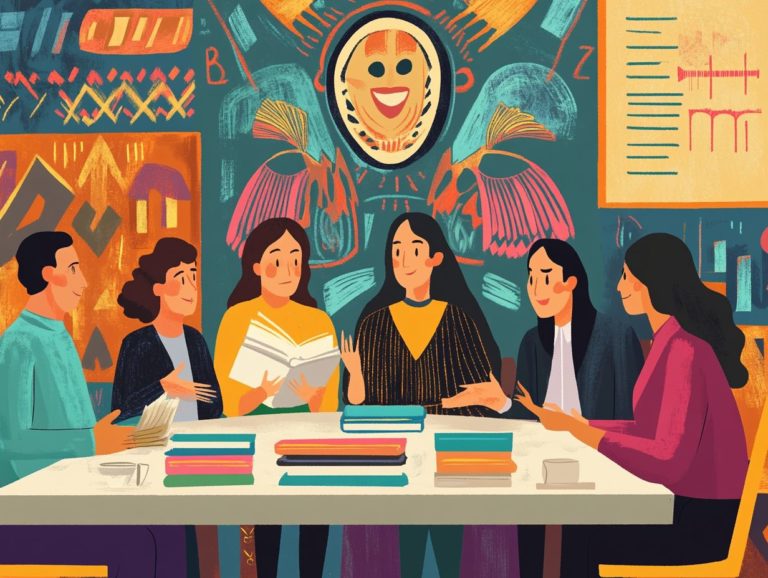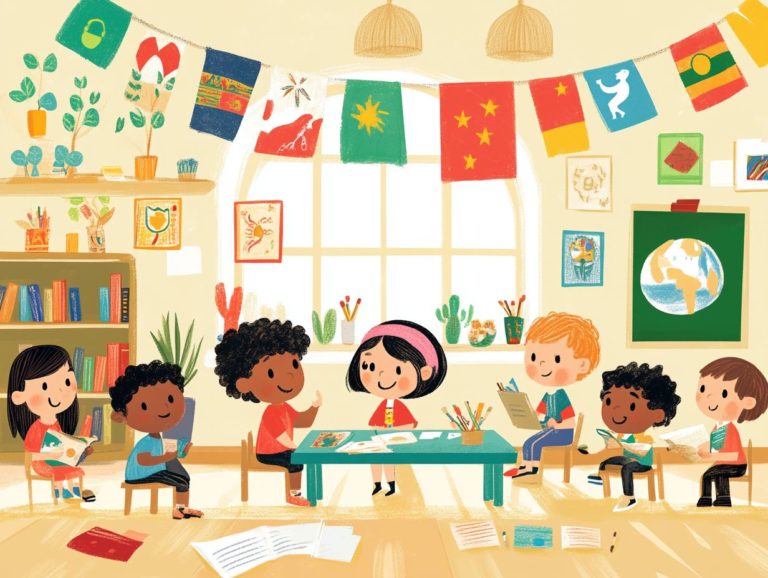the challenges of learning a language in a new culture
Navigating a new culture can be both exhilarating and daunting, particularly when it involves learning a language.
Understanding the intricacies of a foreign language is closely linked to its cultural context, presenting unique challenges along the way. From overcoming communication barriers to adapting to subtle language nuances, you’ll encounter common hurdles as a learner.
This article offers effective strategies for immersing yourself in the culture and highlights the profound benefits that come with mastering a new language. Discover how language learning not only enhances your cultural competence but also opens doors to exciting new career opportunities. Get started today to unlock new possibilities!
Contents
- Key Takeaways:
- The Importance of Language Learning in a New Culture
- Common Challenges in Language Learning
- Strategies for Overcoming Language Learning Challenges
- The Role of Cultural Sensitivity in Language Learning
- Benefits of Learning a Language in a New Culture
- Frequently Asked Questions
- What are the main challenges of learning a new language in a new culture?
- How does cultural immersion affect language learning?
- What are some common misconceptions about learning a language in a new culture?
- What are some strategies for overcoming the challenges of learning a language in a new culture?
- How can language barriers affect social interactions in a new culture?
- What are the benefits of learning a language in a new culture?
Key Takeaways:
- Language learning is crucial for adapting to a new culture and understanding its context.
- Effective communication can be hindered by barriers and cultural differences in language usage.
- Overcoming challenges in language learning involves immersion in the culture and utilizing available resources.
The Importance of Language Learning in a New Culture
Language learning within a new culture is essential for effective communication and personal growth. It connects with the culture, enriching not only your language skills but also your understanding of the importance of cultural sensitivity in language learning.
As you immerse yourself in a second language, you’ll navigate the complexities of grammar, idiomatic expressions, and pronunciation challenges. This enables you to connect with diverse communities.
Carefully designed language programs guide your learning journey, allowing you to thrive in multicultural environments and opening doors to advanced education and career opportunities.
By engaging with cultural materials, you’ll boost your confidence in fluency and enhance your cognitive abilities, ultimately positioning yourself as a valuable bilingual asset in the workplace.
Understanding the Cultural Context
Understanding the cultural context in language learning is essential. It offers valuable insights into the customs and societal behaviors that shape effective communication.
For ESL students, understanding cultural context is crucial. It helps you overcome communication barriers linked to different identities and norms.
You might find it challenging to grasp idiomatic expressions phrases that often don t make sense when translated directly or the unspoken social cues embedded in the host culture. This can lead to misunderstandings during conversations, fostering feelings of isolation or frustration.
By actively seeking opportunities for cultural interactions such as community events or collaborative projects you can bridge these gaps. These experiences not only enhance your language proficiency but also deepen your familiarity with societal behaviors, enabling you to navigate your new environment with greater confidence and ease.
Common Challenges in Language Learning
Language learning presents exciting challenges to tackle, from the intricacies of grammar to the subtleties of pronunciation, and understanding the impact of culture shock on language acquisition can help overcome the communication barriers that can sometimes dampen your motivation.
Barriers to Effective Communication
Barriers to effective communication in language learning can arise from the intricate web of language customs and cultural interactions that you, as an ESL student, must skillfully navigate.
These obstacles can manifest as misunderstandings stemming from idiomatic expressions that simply don t translate well across cultures. Non-verbal cues also vary significantly among different societies, leading to confusion during your interactions.
For example, something that is deemed polite in one culture may come off as rude in another, making it challenging for you to build relationships effectively.
Moreover, the subtle nuances of language like tone and volume can pose their own set of challenges. You might not be familiar with the conversational dynamics expected in your new environment, which can further complicate matters.
Understanding these intricacies is essential for fostering smoother interactions and enhancing your overall communication skills.
Cultural Differences in Language Usage
Cultural differences significantly influence language usage, shaping how idiomatic expressions are understood and employed. These nuances can lead to misunderstandings. A phrase that resonates in one culture might leave someone from another background utterly perplexed.
Take, for example, the idiom “kick the bucket,” which signifies death. If you re not familiar with this cultural context, you could easily take it literally and miss the intended meaning. Such variations underscore the importance of cultural awareness in effective communication.
Recognizing these linguistic differences can enhance interpersonal connections, fostering deeper understanding and appreciation among speakers of diverse languages. This cultural insight helps connect people, facilitating clearer exchanges and enriching conversations.
Strategies for Overcoming Language Learning Challenges
To conquer the challenges of language learning, it s essential to employ effective strategies. Consider immersing yourself in the language, using a variety of language resources, and committing to consistent practice.
These approaches will enhance your skills and deepen your understanding and appreciation of the language.
Immersing Yourself in the Culture
Immersing yourself in the culture is one of the most effective strategies for enhancing language skills and communication abilities. By engaging directly with native speakers and their traditions, you can experience authentic interactions that deepen your understanding of both the language and its context.
Cultural immersion opens doors to real-life situations, enabling you to practice vocabulary and grammar in dynamic environments. This approach accelerates fluency and fosters essential communication skills, such as active listening and cultural sensitivity.
Engaging with local customs, food, and festivities enriches your learning experience, making it both enjoyable and insightful. These interpersonal exchanges cultivate a genuine appreciation for linguistic nuances and boost your confidence in conversing, benefiting anyone eager to elevate their language proficiency.
Utilizing Language Learning Resources
Using effective language learning resources, such as apps and educational tools, can enhance your vocabulary and communication skills. These resources offer interactive methods for immersing yourself in a new language, transforming your study experience into something dynamic.
Apps like Duolingo and Babbel provide gamified lessons with game-like elements that make learning fun and motivate you to practice consistently. Educational programs like Rosetta Stone utilize immersive techniques to elevate your conversational abilities.
Various online platforms and community forums create opportunities for real-life interactions with native speakers, enriching your vocabulary and deepening your understanding of context.
By integrating these diverse tools into your study routine, you expand your lexicon and cultivate a more nuanced grasp of grammar and pronunciation, setting the stage for effective communication in any language.
The Role of Cultural Sensitivity in Language Learning
Cultural sensitivity is crucial! It can transform your language learning experience as it requires you to respect and adapt to cultural norms that enhance communication skills and foster a deeper connection to your identity.
Embracing this sensitivity allows you to navigate the intricacies of language with greater empathy and understanding, transforming your learning experience into something profoundly enriching.
Respecting and Adapting to Cultural Norms
Respecting and adapting to cultural norms is crucial for overcoming communication barriers and enhancing language skills, especially when engaging with learners from diverse backgrounds.
Prioritizing cultural sensitivity bridges gaps in understanding and fosters a collaborative environment where dialogue flourishes. This respect enriches your learning experience and enhances your ability to grasp nuanced meanings and idiomatic expressions that are deeply embedded in cultural contexts.
By embracing the traditions and social practices of others, you cultivate a richer vocabulary and improve your pronunciation. This approach encourages active listening, making you more attuned to non-verbal cues and context-specific expressions. Ultimately, this elevates your communication, making it more effective and meaningful.
This harmonious blend of cultural awareness and language proficiency paves the way for genuine connections and mutual respect in diverse settings. Have you ever experienced a misunderstanding due to cultural differences? Start immersing yourself in a new culture today!
Benefits of Learning a Language in a New Culture
Learning a new language in a different culture offers many benefits. You enhance your cultural understanding and open doors to new career opportunities.
Your communication skills improve as you engage in cultural interactions.
Enhancing Cultural Competence
Improving your cultural competence helps you connect with diverse communities. It also sharpens your communication skills.
This journey introduces new vocabulary and grammar while immersing you in the traditions and values of various cultures.
By understanding idioms and jokes unique to different languages, you gain appreciation for diverse perspectives. This fosters empathy and reduces biases, making communication more effective.
As you interact with native speakers, you’ll discover aspects of your own identity. This bridges cultural gaps and promotes understanding.
This approach to learning significantly enhances your personal and professional interactions in our global society.
Expanding Career Opportunities
Learning languages broadens your career possibilities. Being bilingual gives you unique skills that employers highly value.
In advanced education and high-level professional settings, bilingual individuals enjoy distinct advantages.
Mastering multiple languages enhances international relations and opens doors to leadership roles and collaborative projects.
Bilingualism also sharpens your problem-solving abilities and creativity traits that employers seek.
By using immersive learning techniques, you can improve your language skills. This prepares you to thrive in today’s interconnected world.
Frequently Asked Questions
What are the main challenges of learning a new language in a new culture?
Challenges include adapting to new ways of communicating and understanding cultural nuances, as well as recognizing the impact of culture on language learning techniques. You’ll also face different pronunciation and grammar rules.
How does cultural immersion affect language learning?
Cultural immersion greatly benefits language learning. It allows you to practice in real-life situations with native speakers.
However, adapting to new customs can be challenging.
What are some common misconceptions about learning a language in a new culture?
A common misconception is that learning a language guarantees fluency in the culture. In reality, understanding takes time and effort.
What are some strategies for overcoming the challenges of learning a language in a new culture?
To overcome challenges, seek opportunities to practice. Be open-minded and respectful of cultural differences.
Patience and persistence are key in the learning process.
Language barriers hinder effective communication and can lead to misunderstandings. This makes it hard to form meaningful connections.
What are the benefits of learning a language in a new culture?
Learning a language in a new culture broadens your perspective and improves communication skills. It opens doors for personal and professional growth.
You also develop a deeper appreciation for diversity and multiculturalism.






